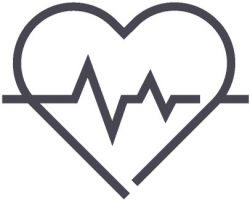Am I at risk for a heart attack or stroke? What is the best home blood pressure monitor? How do I take my blood pressure?
Natural Beta Blockers
When you visit your doctor for a checkup, he will take your blood pressure. If the systolic blood pressure is 120 mmHg or less, and your diastolic blood pressure is 80 mmHg or less, you have normal blood pressure. But if it’s between 120/80 mmHg and 180/120 mmHg, you have Stage 1 Hypertension or Stage Two Hypertension.
If your doctor confirms a Hypertensive Crisis (blood pressure greater than 180/120), immediate medical attention is a must as you are at high risk of stroke and heart disease.
Your doctor will ask you to get regular exercise, eat a balanced diet, have a good night’s sleep and drink more water. The whole point is to lead a healthier life. Your doctor may also prescribe medication such as beta blocker drugs.
Want to know more about beta blocker drugs? In this article, we explain what beta blocker drugs are, what they do, and how they work. We also compare to calcium channel blockers as well as highlight some risks and side effects.
What four best-selling hypertension drugs can cause serious bodily harm or even death? Find Out Here.
What Are Beta Blockers?
Beta blockers are drugs that help reduce blood pressure. Also known as beta-adrenergic blocking agents, this medication is prescribed to treat arrhythmia and other conditions.
Beta blockers reduce the force at which your heart beats. This in turn lowers your blood pressure. They also help open your arteries and veins, increasing blood flow.
There are several types of beta blockers:
- Propranolol
- Nebivolol
- Nadolol
- Bisoprolol
- Atenolol
- Metoprolol
- Pindolol
- Penbutolol
- Timolol
- Carvedilol
- Carteolol
- Betaxolol
How Do Beta Blockers Work?
Beta blockers work by preventing adrenaline and noradrenaline in the sympathetic nervous system. The sympathetic nervous system triggers the fight or flight response.
Basically, adrenaline and noradrenaline prepare the muscles for exertion. Overexposure to these hormones is harmful. In fact, too much adrenaline leads to excessive sweating, high blood pressure, and palpitations.
Beta blockers work by blocking the release of these hormones. Oxygen demand decreases, which reduces stress on the heart. This lowers the force of contractions experienced by blood vessels, heart muscles, the brain, and the whole body.
Apart from blocking adrenaline, beta blockers obstruct the production of angiotensin II. Angiotensin II is a hormone released by the kidneys. By blocking the production of this hormone, your blood vessels will relax and widen. This allows the smooth flow of blood.
Beta Blockers vs. Calcium Channel Blockers
Calcium channel blockers are prescription drugs for relaxing blood vessels, increasing blood supply. By doing so, they help to lower the heart’s workload. In turn, this helps to decrease blood pressure in patients with hypertension. Also referred to as calcium antagonists, they also disrupt the movement of calcium.
Calcium channel blockers are readily available in short-acting and long-acting forms. Examples include:
- Felodipine
- Nicardipine
- Isradipine
- Nisoldipine
- Amlodipine
- Verapamil
Beta blockers and calcium channel blockers work to dilate arteries and veins, increasing blood flow in the body. They both help in the treatment of migraine headaches, chest pain, and abnormal heart rhythms.
Similar side effects of beta blockers and calcium channel blockers include rash, sexual dysfunction, and nausea.
While both beta blockers and calcium channel blockers are used in the treatment of high blood pressure, they have a few differences.
Beta blockers work by inhibiting the production of adrenaline and noradrenaline. Calcium channel blockers inhibit the movement of calcium. Beta blockers can treat more than hypertension. In fact, they can treat heart failure, atrial fibrillation, and myocardial infarction or heart attack. Calcium channel blockers can also treat cluster headaches.
Some of the side effects of beta blockers are different from those of calcium blockers, including edema, constipation, low blood pressure and dizziness. Sudden withdrawal of beta blockers can cause a heart attack or worsen chest pain. Also, it can cause serious abnormal heart rhythms and sudden death.
It’s vital to avoid grapefruit juice if you are taking calcium channel blockers. This is because grapefruit juice interacts with the medication and can affect your blood pressure and heart rate. It can also cause symptoms such as dizziness and headaches.
What food can lower blood pressure up to 12 points (as much as many hypertension drugs)? Click for Info.
Natural Alternatives to Beta Blockers and Calcium Channel Blockers
There are several foods, supplements, and herbs that act as natural beta blockers or calcium channel blockers. In the body, these foods and herbs help to reduce inflammation, relieve anxiety and reduce blood pressure.
They include:
- Fresh fruits and vegetables rich in antioxidants
- Meat, poultry, nuts, and seeds are rich in L-Arginine
- Bananas, fish, potatoes and dairy products rich in calcium and potassium
- Garlic, hawthorn, red yeast rice, Indian snakeroot, and barberry
- Omega-3 and magnesium supplements
Certain foods, supplements or herbs may interact negatively with medications you are taking. It is essential to consult your doctor before starting any herbal or vitamin supplements. Also, for your safety, do not stop taking beta blockers or calcium channel blockers without the approval of your doctor.
Get our #1 recommendation for lowering blood pressure naturally HERE.
